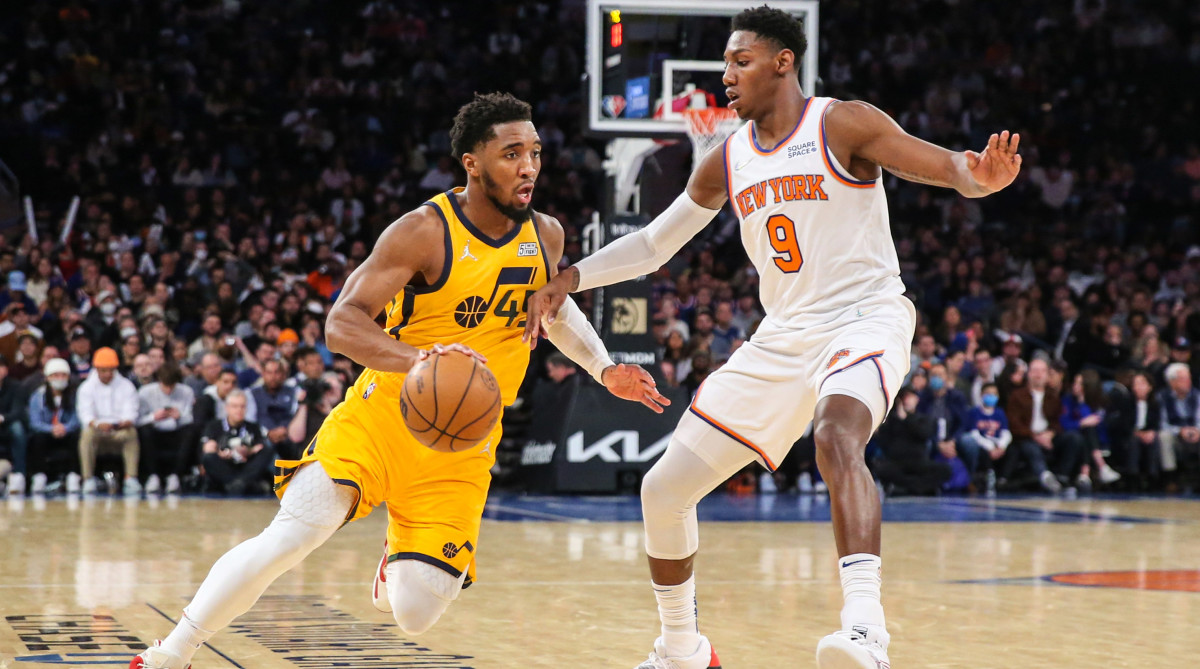Congratulations, New York, you
didn’t get Mitchell.
And you should be just as happy about that.
Utah executed its second blockbuster trade in three months on Thursday, shipping Mitchell to Cleveland for three first-round picks—
unprotected first-round picks—two pick swaps and a handful of players Jazz CEO Danny Ainge probably doesn’t care too much about. The Cavs, armed with one of the NBA’s best backcourts—LeBron James, responding to a tweet about how tough a Mitchell-Darius Garland backcourt would be,
replied “SO TOUGH”—a long, athletic front line and still solid supporting cast, have the pieces for a deep playoff run. The Jazz, after offloading Mitchell
and Rudy Gobert, will spend this season
practicing how to pronounce Wembanyama.
The Knicks? They should be glad they stayed out of it. Talks between New York and Utah have been going on for weeks, with the Jazz hoping to extract the same pound of flesh they did from Minnesota and New York doing everything it can to resist it. A Leon Rose-imposed Monday deadline came and went, followed by the Knicks inking R.J. Barrett to a long-agreed upon extension. That opened the door for Cleveland, a surprise play-in entry last season, to swoop in and make a deal.
There will be some grumbling about the Knicks’ refusal to meet the Jazz’s price, but seriously—be happy they didn’t. This has nothing to do with Mitchell, a terrific player, a better person, a 25-year old, Elmsford, N.Y.-born, Queens—by virtue of Mitchell’s father, Donovan Sr.’s, position in the front office of the Mets—raised two guard whose best days are ahead of them. It’s that while Mitchell pushes the Cavs closer to a championship level, the cost of a Mitchell deal, long term, could have set the Knicks back.
Think about it: What if New York had met Ainge’s asking price? R.J. Barrett would have been gone. Multiple first-round picks, along with swap rights, which Ainge was determined to collect, would have been out the door, too. Would the Knicks have been better than the 37-win team that missed the playoffs last season? Sure. Would they have made the playoffs in a suddenly
loaded Eastern Conference? I’m not so sure about that.
What would a Mitchell-led Knicks team looks like? A Mitchell-Jalen Brunson frontcourt is appealing. Offensively, at least. But then what? Can you count on a bounce-back year from Julius Randle? Giant leaps forward from Obi Toppin, Immanuel Quickley and Quentin Grimes? A big year from Mitchell Robinson? Something from Cam Reddish?
Here's the thing, New York: You’re average. And that’s O.K. For decades the Knicks have been searching for basketball’s silver bullet, signing mediocre players to bloated contracts, dumping draft picks in ill-advised trades. Two lottery picks for Eddy Curry. Another for Andrea Bargnani. Previous front offices, routinely run by unqualified executives or James Dolan yes-men, looked overmatched. When Barrett signed his extension this week, he became the first Knicks first-round pick to sign an extension this century.
New York is fine. It is not as good as the 41-win team that shocked the NBA during the pandemic-shortened 2020-21 season, nor is it as bad as the sloppy group that stumbled through the last one. But it is developing. The Knicks have Brunson, a budding scorer in Dallas anxious for a bigger role. They have Robinson, a 24-year old shot blocker still oozing with potential. They have Barrett, a just-turned 22-year old forward coming off his 20-point per game season. Is he a franchise player? Probably not. But he’s a 6-foot-6, scorer strapped with a mid-30% level three-point shot. He’s inefficient, but people close to Barrett say an offseason spent working on his finishing as well as adding a more polished off the dribble jumper should improve that.
There’s no rush. At least there shouldn’t be. The Knicks have good young players. They are armed with a cache of draft picks. If the scouting department does its job—and Barrett, Grimes, even Jericho Sims, a second-round pick in 2021 who looked sharp in summer league, suggest it is—New York will grow organically. Which may give the Knicks more staying power.
So relax, New York. It will be hard to watch the Cavs next season, to watch Mitchell thrive on a team that should fight for a top-five seed while the Knicks claw towards the play-in. But this is the way it goes. The Cavs were in position to go all-in to get Mitchell because they spent the last four years drafting smart and trading shrewdly, building a team that was a Mitchell-level player away from being a contender. The Knicks, simply, are not there yet.







